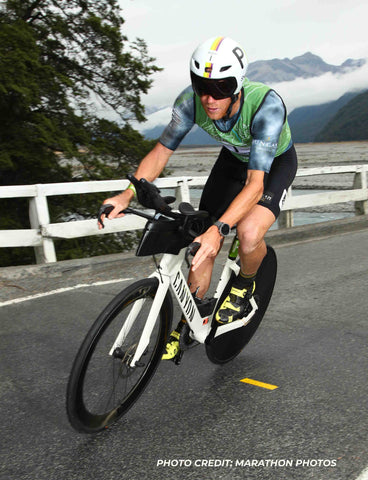Making a profession out of doing what you love - the pro's speak.
CurraNZ interviews three top athletes on how they made a profession out of their passion for their sport.
Following your passion to carve out your future career definitely causes some people to ponder – ‘what if I ran or cycled or did multi-sport for a living?’
Here, some of our professional athlete ambassadors, Amelia Watkinson (Triathlon), Dougal Allan (Multi-sport) and Ruth Croft (Trail/endurance running) reveal what they learned on their transition from amateur to pro.
What were the top two-three things that helped you succeed in the transition from amateur to pro?
AMELIA:

My shift in priority, approach and mindset. Which was certainly a transition period! I learnt that training sessions themselves are only half of it. It takes years to learn and then set up an environment that you can thrive in and stay healthy. For me being able to structure life around training rather than squeezing it between work, life and study was a nice initial step. But more importantly was learning the big picture. Observing and gaining as much knowledge from other athletes and coaches. Of course the daily ‘1%ers’ really do add up. And the consistent approach to sessions and races, the good and bad.
DOUGAL:
Number one was having a good team around me including my coach, training partners and friends. They all seemed to believe in me before I could believe in myself.
The next was learning the art of recovery. I realised I was good at training and had a hunger to perform on race day, but the key to making a career from the sport was understanding how to make it consistent and sustainable through recovery.
Finally, I think my choices were important as to where I invested my time, money and energy. I had to prioritise early nights over late ones with friends, healthy eating over takeaways, regular massage over movie tickets and race entries over music concerts. I have never liked the word ‘sacrifice’ – to me it’s about choices we make and how we invest ourselves.
RUTH:
Passion. If running was not my ultimate true passion, all the work, commitment, and effort would not be worth it. Titles, medals, or pay checks are only meaningful when they are a reflection of living my passion to the fullest.
Commitment. I wanted to become pro but at the time I was living in Taipei, Taiwan, which was not conducive for training or good preparation for racing in the Alps. It was tough at the time to make the call to leave my stable job and income to move back to NZ and pursue trail running, especially when it was not able to financially support me.
However, moving back to NZ meant I was finally in a suitable training environment and I could still work on the side to support myself. Sometimes you have to take that leap of faith, commit 100%, and trust that if you set yourself up right you will be in the best position to succeed.
What do you wish you someone had told you before you decided to become a pro runner/athlete that you had to learn from experience?

AMELIA:
The graph is far from exponential!
DOUGAL:
To keep at it through the down times and moments where it all seems futile. I never got into endurance sport for fame or fortune (thank goodness), I got into it because I felt (and still feel) it suits my desire to push myself harder and further than the people around me. But in the darkest times when I have failed to finish races, finances were stretched or injuries have struck, I feel I would have benefited if someone had told me at the beginning that everything would be OK and it would all be worth it in the end. Learning this along the way has been empowering, but extremely tough at the same time.
RUTH
That I would never have pretty feet again.
How did you know you were ready to turn pro?
AMELIA: It came fairly organically. I was a good U19 junior athlete, national champ in cycling and top 10s in running and triathlon. Through university I continued on a much more casual basis as I had to keep fit coaching the kids' cycling team. Over summer a friend changed my entry from age group to the Open/Pro category at a race in Tauranga, I won. With some extra confidence I picked up the training, continued to race and podium on the Pro domestic scene, before being enticed by the travel component of international Pro races and earning my pro licence.
DOUGAL: It was results-driven really. It was never my intention to be a professional athlete. My involvement in sport has always been based purely on a love for what I do. I managed to get some good results early on (fresh out of university) and it made sense to continue the journey of self-discovery by pitting myself against the elite/professional competition. I continue to believe now that when I am no longer capable of competing professionally, I will still continue my involvement in endurance sport for all the same reasons, I will just find myself lined up against amateur athletes instead, still doing what I love.

RUTH
I didn’t, however I committed to becoming a professional athlete entirely and after winning my first international race (UTMB CCC in 2015). It took another four years to get to that point of being able to sustain myself through my sport.
Many thanks to Amelia, Dougal and Ruth for sharing their stories. CurraNZ is proud to have such a fantastic bunch of ambassadors representing our product and sharing many important values.
Photo credit for feature image of Dougal at C2C: Korupt Vision.